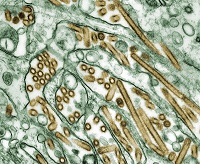 |
| H5N1 viruses (gold) grown in MDCK cells (seen in green)--Image courtesy of Wikimedia Commons |
University of Maryland researchers are developing a new vaccine against H5N1 avian influenza, also known as bird flu, identified by the World Health Organization as a potentially pandemic virus.
Researchers tested a new nasal spray vaccine in both mice and ferrets and found promising results--that is, they observed no clinical disease signs or changes in body weight in vaccinated animals. The vaccine uses a live but weakened version of the H9 virus with an H5 gene added into one of the H9 virus' segments.
The danger of using weakened, or attenuated, virus vaccines is that they have the potential to revert to a virulent form and cause disease. But UMD researchers said they took steps to make the vaccine safer. The influenza genome comprises 8 RNA "segments," and when viruses reassort, they exchange segments. Only viruses that contain all 8 segments are viable.
Researchers split apart segment 8--which carries the NS1 and NS2 genes--and moved the NS2 gene into segment 2, next to the polymerase gene, which copies the virus' genetic material during replication. Researchers said this slows down the gene's function, interfering with the virus' ability to replicate and making the vaccine safer.
The vaccine was also effective against the H9 subtype of avian influenza in animals. The research is slated to run in the May issue of the Journal of Virology.
So far, H5N1 has never reached the point where it could spread easily among humans. But outbreaks of the disease have been reported in Asia, Africa, the Pacific, Europe and the Middle East since 1997, according to the U.S. Centers for Disease Control and Prevention.
Meanwhile, the FDA has delayed its approval of a bird flu vaccine developed by GlaxoSmithKline ($GSK). GSK's earlier H1N1 flu vaccine has been linked to an increase in narcolepsy cases among children.
- here's an advance copy of the research paper (PDF)
- and here's the press release